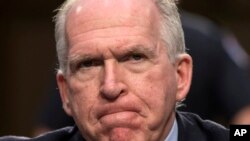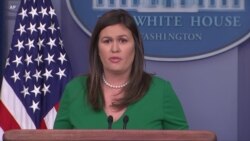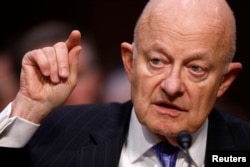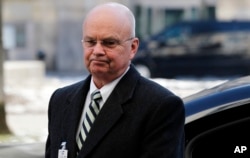The security clearance of a former Central Intelligence Agency director was revoked Wednesday by U.S. President Donald Trump, who said in a statement that John Brennan had been sowing "division and chaos" about his administration.
The clearances of other former officials also were under review, including those of former U.S. National Intelligence Director James Clapper, former FBI Director James Comey, former Obama administration national security adviser Susan Rice, former National Security Agency Director Michael Hayden and former Deputy Attorney General Sally Yates.
"Security clearances for those who still have them may be revoked, and those who have already their lost their security clearance may not be able to have it reinstated," White House press secretary Sarah Sanders said to reporters Wednesday, reading out the statement in the president's name.
Sarah Sanders Reads Trump Statement Revoking Clearances
Sanders, responding to reporters' questions, denied that Brennan and others were being singled out because they were critics of Trump.
The president's statement accused Brennan of "erratic conduct and behavior" that "has tested and far exceeded the limits of any professional courtesy that may have been due to him." It also accused Brennan of "a history that calls into question his objectivity and credibility."
Brennan has been extremely critical and outspoken about the president's conduct. For example, he called Trump's performance at a joint press conference last month with Russian President Vladimir Putin in Finland "nothing short of treasonous.''
Brennan, on Twitter, termed Trump's action Wednesday part of a broader effort "to suppress freedom of speech and punish critics," adding that it "should gravely worry all Americans, including intelligence professionals, about the cost of speaking out."
Brennan, who spent 25 years with the CIA, concluded: "My principles are worth far more than clearances. I will not relent."
"Two things, in my view, are true at the same time," Carmen Medina, former CIA deputy director of intelligence, told VOA. "It was unwise for Brennan to be so vitriolic in his comments — unwise but not illegal. And it is an abuse of power for Trump to revoke clearances, unless he can prove misuse of classified information, which I don't think he can."
Such former top officials, as a matter of courtesy, retain their government clearances so that they may be able to consult with current government officials or take outside positions for contracted entities that are involved with sensitive intelligence matters.
An official with knowledge of the process told VOA that senior intelligence officials "had no hand in this, no role in this."
Both the Office of the Director of National Intelligence and the Central Intelligence Agency referred to the White House all questions from VOA about the matter.
Senator Rand Paul, a Kentucky Republican, applauded the president's action, saying he had urged the president to do so because Brennan's "behavior in government and out of it demonstrate why he should not be allowed near classified information."
"He participated in a shredding of constitutional rights, lied to Congress, and has been monetizing and making partisan political use of his clearance since his departure," Paul said in a statement.
Danger seen to free speech, security
But critics of the move to strip Brennan's clearance called it a threat to free speech and even national security.
"It's unprecedented. I don't know of a case where this has ever been done in the past," former Director of National Intelligence James Clapper said on CNN.
Clapper, a retired Air Force lieutenant general who had been appointed to top intelligence posts by both Republican and Democratic presidents, called Trump's action "an infringement of our right to speak and apparently the appropriateness of being critical of this president, in which one degree or another all of us have been."
Clapper noted he'd had no access to intelligence information since he left government on the day Trump was inaugurated, succeeding Barack Obama.
The threat to pull his security clearance, Clapper added, would not silence him. "I don't plan to stop speaking when I'm asked my views on this administration," Clapper said on CNN.
Retired General Michael Hayden, who headed both the CIA and NSA during his career, said losing his clearance would "have a marginal impact" on the work he's doing now. He also said fear of losing that clearance wouldn't stop him from speaking his mind.
"With regard to the implied threat today that I could lose my clearance, that will have no impact on what I think, say or write," he said in an emailed statement.
Most of the names on the list that Sanders read "have been open or outspoken about the administration or have directly run afoul of it," Clapper said.
The current administration has questioned the loyalties of such officials, viewing their comments as attacks against the president, especially those focusing on the intelligence findings that Russia intervened in the 2016 election won by Trump.
Paul Pillar, a former senior CIA officer now with Georgetown University in Washington, told VOA that arguments could be made for and against former senior officials retaining security clearances after they've left those positions. But he added that the decision should not be made because of opinions they express.
Politicization of process
"Deciding on such a basis represents a corruption and politicization of an important national security process," Pillar said. "The harm to U.S. national security comes from that corruption, much more so than from not being able to get advice in classified channels from John Brennan or any other former official. What's to stop Trump from politicization of the clearance process for currently serving officials?"
A former CIA deputy director, John McLaughlin, speaking on MSNBC after Sanders read the names, said, "The message that goes out is: Be careful what you say" about Trump.
McLaughlin said it was critical for intelligence professionals, especially those still in their jobs, to be able to deliver unpleasant news to a president, and he expressed hope that Trump's action would not have a chilling effect on those who brief the president.
"This has zero to do with national security. This is an Official Enemies List. The offense: exercising 1st Amendment rights," tweeted Michael Bromwich, a former inspector general of the Justice Department, which oversees federal law enforcement.









